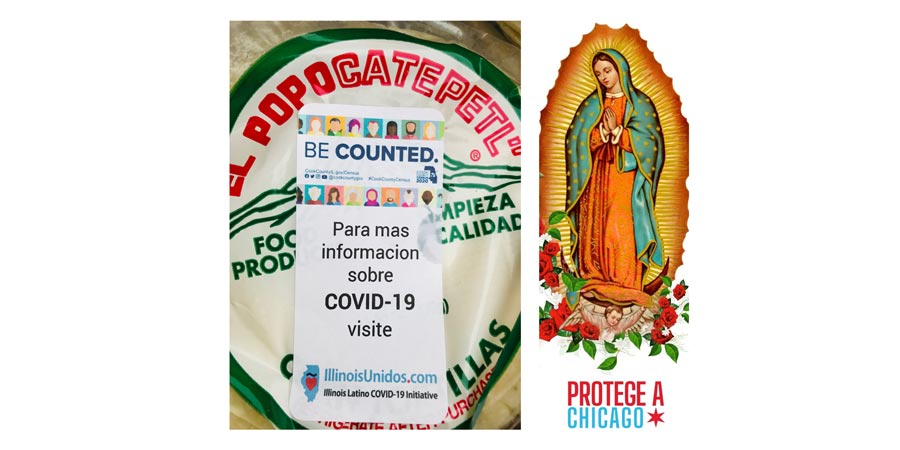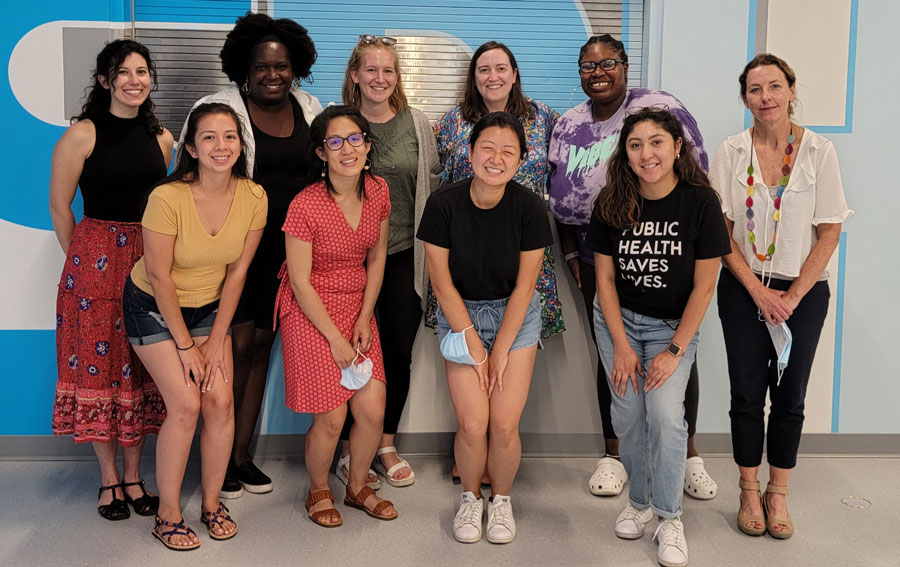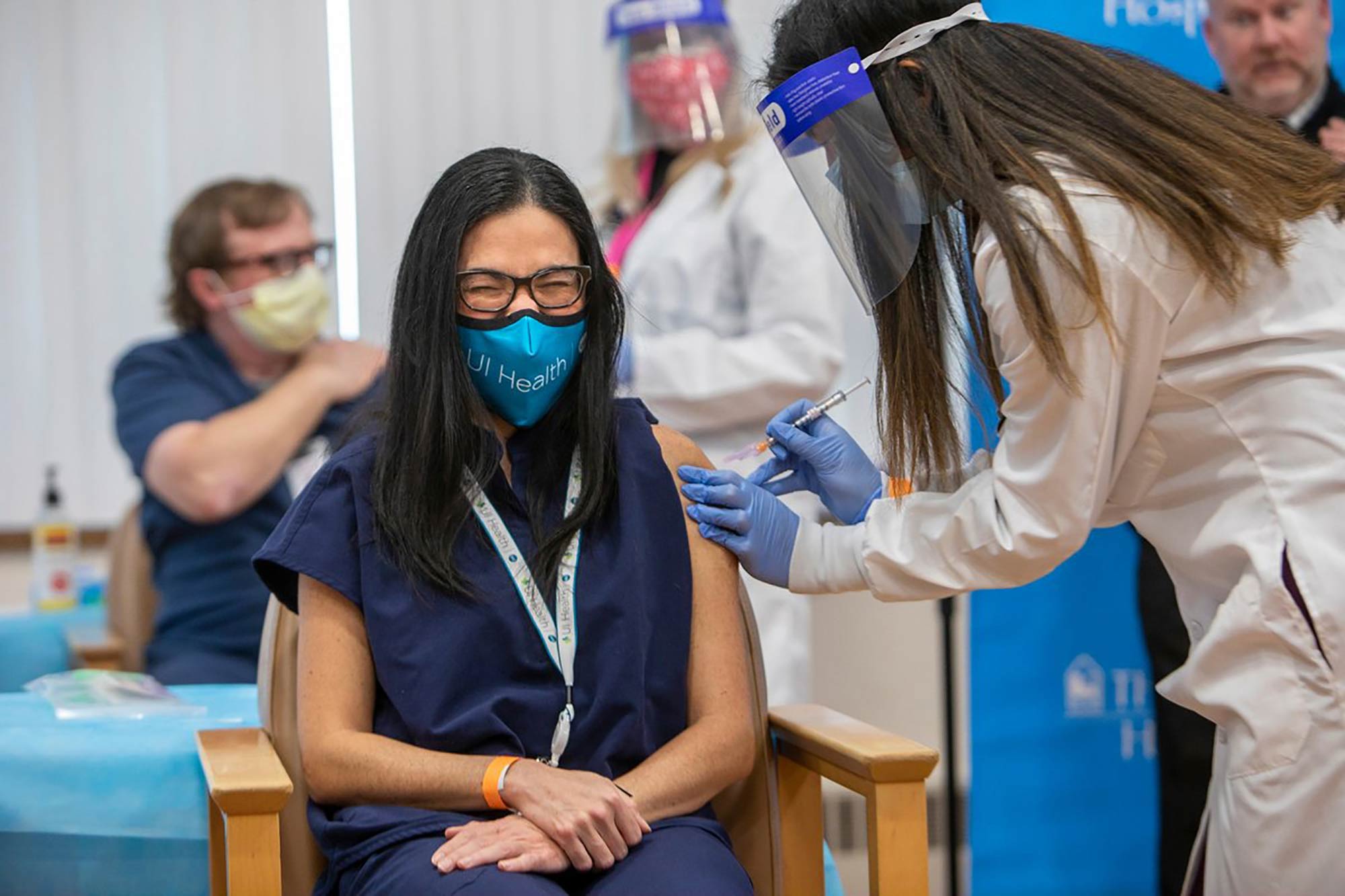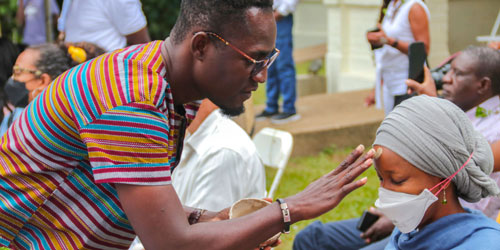Illinois Unidos and the UIC School of Public Health Collaboratory for Health Justice play crucial roles in directing support where it is needed most.
When COVID-19 became a global health crisis in the spring of 2020, public health experts worldwide heard the same concern: financial support from government and international organizations was failing to reach crucial, community-based organizations (CBOs) trusted by those hit hardest by the pandemic.
About the same time, friends Xavier Nogueras and Cesar Rolon saw the virus devastate Latinx communities in Chicago. Both marketing executives used their contacts with elected officials, healthcare professionals, and nonprofits to become the driving forces in creating Illinois Unidos. They formed a network of more than 200 volunteers addressing the immediate and long-term impacts of COVID-19 on Latinx residents. Illinois Unidos, now a program of the Latino Policy Forum, also works to ensure that the pandemic’s impact on the Latinx population is understood widely and addressed equitably.
“If there was a mistake, the mistake was that the public sector felt that they had to figure it out first,” Nogueras said. “That’s not a criticism. They were very well-intentioned. But they realize now that they have to do it in lockstep from the beginning with the community.”
COVID Information on Tortilla Packages
Illinois Unidos is a multidisciplinary partnership that included community organizers, early childhood education experts, frontline healthcare workers, and public health experts. It helped government officials and philanthropic organizations understand COVID-19 at the neighborhood level. That work included advocating for less reliance on data on COVID hospitalizations in the Latinx community as an indicator of the pandemic’s severity. Some in the Latinx community avoided hospitals, fearing that seeking treatment would endanger their ability to remain in the U.S.
Illinois Unidos’ success gave a more accurate picture of the pandemic’s toll in Latinx communities and helped distribute resources equitably.
The organization undertook other measures to lessen the pandemic’s severity, including creating a website with COVID-19 information in English and Spanish and placing labels bearing the website address on tortilla packages. The organization handed out informational bookmarks during the Día de la Virgen de Guadalupe celebration, posted social media ads, and helped produce a broadcast about COVID-19 on Telemundo.

Illinois Unidos placed labels with its COVID-19 website on tortilla packages and circulated information on bookmarks during the Día de la Virgen de Guadalupe celebration.
The group also pushed to improve vaccination appointment access for people without internet availability. It called for health and government officials to map cases by geography and use contact tracing to pinpoint where COVID-19 testing strategies proved successful. Those initiatives built trust among residents, which led to improved vaccination numbers and wider acceptance of credible COVID-19 information.
“I think those things—continuing to push the conversation and having uncomfortable and difficult conversations with political leaders—that's what I'm most proud of,” said Dr. Marina Del Rios, an emergency room physician, and Illinois Unidos member. “As I say, we're always keeping it real with our politicians.”
Contact Tracers’ Expanded Roles
About a year before Nogueras and Rolon organized Illinois Unidos, the School of Public Health at the University of Illinois at Chicago (UIC) established the Collaboratory for Health Justice. It advances health equity and strengthens UIC’s connection to the city, region, and state by engaging community members in research, teaching, and public health practice.
As the virus became a serious and widespread concern, the Collaboratory reached out to community organizations to better assess how UIC could help.
Engaging community members, who know their neighborhoods best, was an immediate priority. The Collaboratory became a key partner in the Chicago COVID-19 Contact Tracing Corps, which recruited 31 CBOs to hire 600 contact tracers from Chicago neighborhoods.
Throughout the pandemic, the CBOs and contact tracers have adapted, expanding their roles to become vaccine educators and then providers of broader public health information to enhance the community’s knowledge.
Melissa Martin, Chicago COVID-19 Contact Tracing Corps Coordinator, was amazed at the versatility and adaptability of those early CBOs and contact tracers.
“They have outreach skills, understanding of public health and social determinants of health, and risk communication skills,” she said. “I think, if given the knowledge, they have the skill set to effectively communicate about a number of different topics. Having that expertise in the community is only going to make us stronger.”

University of Illinois-Chicago's Collaboratory for Health Justice team was a key partner of the Chicago COVID-19 Contact Tracing Corps, which recruited community-based organizations to hire 600 contact tracers from the community.
Another recent Collaboratory initiative is the Youth Citizen Science Program (YCSP), a course that introduces 14- to 24-year-old Chicagoans to the public health field. YCSP also guides participants on the complex history and politics of science and on how science can be used to drive change in their communities.
With a curriculum the participants helped design, the class centers on their experience and perspective. It is part of an effort to make science accessible to all by prioritizing residents’ roles and community knowledge and by exposing them to different viewpoints about science.
“We started with an assumption that young people already know a lot of things (about public health),” said Glenna Sullivan, a research specialist who works with the YCSP. “So really, it's about eliciting the knowledge and giving them the opportunity to apply it in thinking about solutions, or in data, or research, or working for action and for social justice.”
Maintaining a Presence for the Future
As the community engagement arm of an accredited school of public health at a large public university, the Collaboratory embraces the opportunity to serve residents throughout Illinois. Its response to the pandemic was a huge opportunity to serve residents. Collaboratory leaders plan to formalize the community network assembled to recruit contact tracers, expand it to an additional 20 CBOs on Chicago’s South and West Sides, and design programs and curriculum to meet communities’ health needs in the future.
Nogueras said the coalition hopes to expand Illinois Unidos and convert it to a resource that can address all community health issues and health inequities that COVID-19 exposed among Latinx residents. The partnership’s immediate objectives include adding paid policy analysts to the volunteer initiative and enhancing its communications.
Nogueras acknowledged that Illinois Unidos has helped solve health inequities associated with COVID-19, “but it was a dent,” he said. “We can do more than that if we have more capacity.”
And he does not want Illinois Unidos “to be another partnership that formed during a crisis,” only to dissolve after.
“That’s what we see all the time, especially in communities of color,” he said. “We don’t want that to happen. We need this to be sustainable.”
In 2021, MacArthur supported the Latino Policy Forum, where Illinois Unidos is based, with $360,000 for general operations, and the UIC School of Public Health’s Collaboratory for Health Justice with $500,000. The funding to both organizations is part of the Foundation’s Equitable Recovery public health grants.





